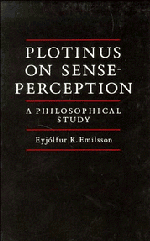Book contents
- Frontmatter
- Contents
- Acknowledgements
- Introduction
- I Plotinus' metaphysics
- II Plotinus' views on the soul and man
- III The relation between the eye and the object of vision
- IV Sensory affection
- V The unity of the senses
- VI The objects of perception
- VII Perceptions as acts and forms in perception
- VIII Conclusions
- Abbreviations
- Notes
- Bibliography
- Index
II - Plotinus' views on the soul and man
Published online by Cambridge University Press: 07 May 2010
- Frontmatter
- Contents
- Acknowledgements
- Introduction
- I Plotinus' metaphysics
- II Plotinus' views on the soul and man
- III The relation between the eye and the object of vision
- IV Sensory affection
- V The unity of the senses
- VI The objects of perception
- VII Perceptions as acts and forms in perception
- VIII Conclusions
- Abbreviations
- Notes
- Bibliography
- Index
Summary
Synopsis of the theory of souls
In order to approach Plotinus’ views on man and the human soul it will be helpful to have a synopsis of his general theory of souls. According to Plotinus’ orthodox view one must distinguish between at least four kinds of soul.
There is (1) a transcendent soul which is not the soul of any particular thing, either individuals or the cosmos, and is said to remain in the intelligible realm. Although this soul is, presumably, ontologically posterior to the Intellect, it is in fact not clear how they differ as regards internal properties: both are wholly engaged in pure thinking. But the different terms do suggest a difference in function. Plotinus normally chooses to talk about soul when he is concerned with the generation of the sensible from the intelligible, whereas the term “Intellect” is reserved to refer to the life in the intelligible as contained in itself. For clarity I shall write “Soul” with a capital S when I want to refer to this transcendent soul.
There is (2) the World-Soul which is responsible for the life of the visible cosmos. The usual doctrine is that the World-Soul rules the cosmos without descending into it as its body. Often, however, Plotinus distinguishes between two levels of the World- Soul, a higher level, which is the one just mentioned, and a lower, immanent level. Even if this lower level is on any account closely tied with the higher World-Soul by being its direct ontological descendant, it is for various reasons convenient to discuss them under separate headings.
Information
- Type
- Chapter
- Information
- Plotinus on Sense-PerceptionA Philosophical Study, pp. 23 - 35Publisher: Cambridge University PressPrint publication year: 1988
